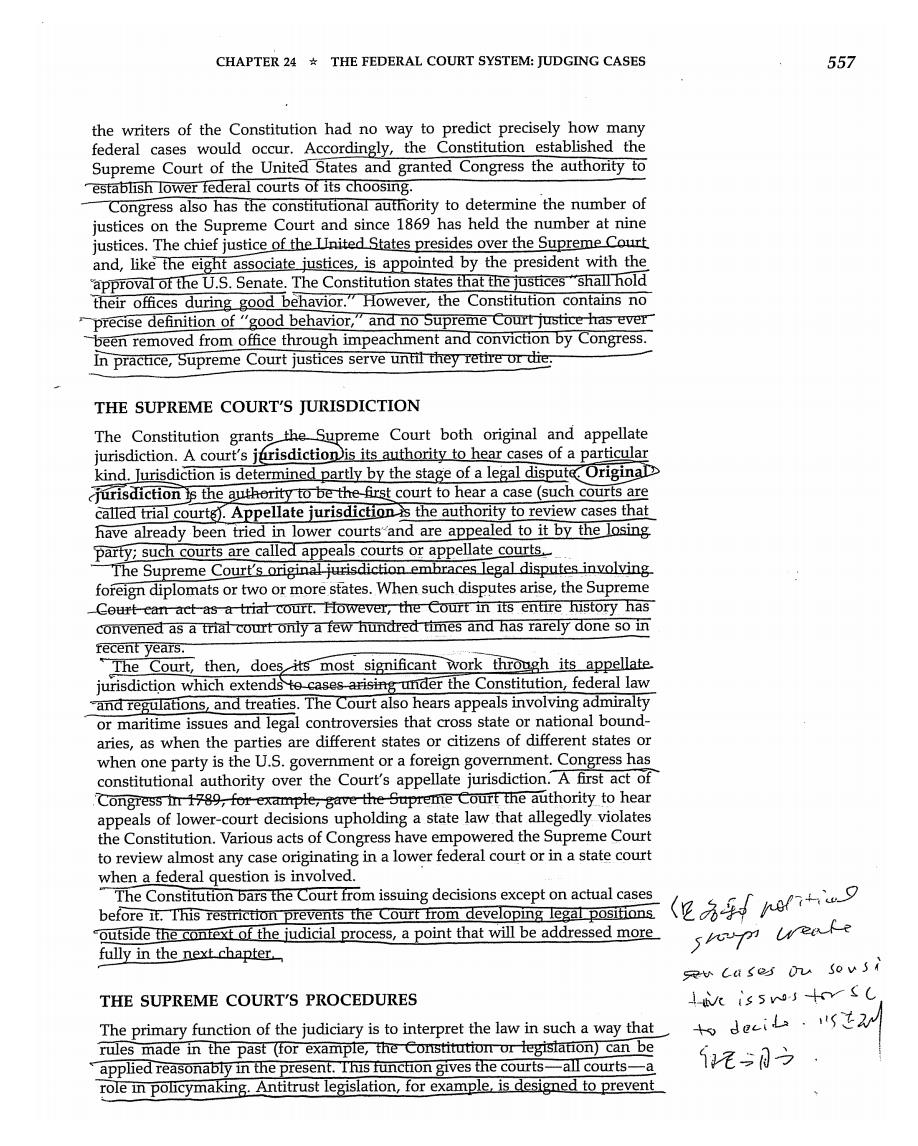正在加载图片...

CHAPTER 24 THE FEDERAL COURT SYSTEM:JUDGING CASES 557 the writers of the Constitution had no way to predict precisely how many federal cases would occur.Accordingly,the Constitution established the Supreme Court of the United States and granted Congress the authority to establish lower federal courts of its choosing. Congress also has the constitutional authority to determine the number of justices on the Supreme Court and since 1869 has held the number at nine justices.The chief justice of the UInited States presides over the Supreme Court and,like the eight associate justices,is appointed by the president with the approval of the U.S.Senate.The Constitution states that the justices "shall hold their offices during good behavior."However,the Constitution contains no precise definition of "good behavior,"and no Supreme Court justice has ever been removed from office through impeachment and conviction by Congress. In practice,Supreme Court justices serve until they retire or die. THE SUPREME COURT'S JURISDICTION The Constitution grants the Supreme Court both original and appellate jurisdiction.A court's jarisdiction is its authority to hear cases of a particular kind.Jurisdiction is determined partly by the stage of a legal dispute.Original jurisdiction is the authority to be the first court to hear a case(such courts are called trial courte).Appellate jurisdiction is the authority to review cases that have already been tried in lower courts and are appealed to it by the losing party;such courts are called appeals courts or appellate courts. The Supreme Court's original jurisdiction embraces legal disputes involving foreign diplomats or two or more states.When such disputes arise,the Supreme Court can act as a trial court.However,the Court in its entire history has convened as a trial court only a few hundred times and has rarely done so in recent years. The Court,then,does its most significant work through its appellate jurisdiction which extends te-cases-arising under the Constitution,federal law and regulations,and treaties.The Court also hears appeals involving admiralty or maritime issues and legal controversies that cross state or national bound- aries,as when the parties are different states or citizens of different states or when one party is the U.S.government or a foreign government.Congress has constitutional authority over the Court's appellate jurisdiction.A first act of Congress in 1789,for-example,gave the-Supreme Court the authority to hear appeals of lower-court decisions upholding a state law that allegedly violates the Constitution.Various acts of Congress have empowered the Supreme Court to review almost any case originating in a lower federal court or in a state court when a federal question is involved. The Constitution bars the Court from issuing decisions except on actual cases before it.This restriction prevents the Court from developing legal positions. (ea到人+可 outside the context of the judicial process,a point that will be addressed more mLwe人e fully in the next chapter. 元ucase0ou5 THE SUPREME COURT'S PROCEDURES Li isswstorsc The primary function of the judiciary is to interpret the law in such a way that rules made in the past (for example,the Constitution or legislation)can be applied reasonably in the present.This function gives the courts-all courts-a 元-月→ role in policymaking.Antitrust legislation,for example,is designed to prevent